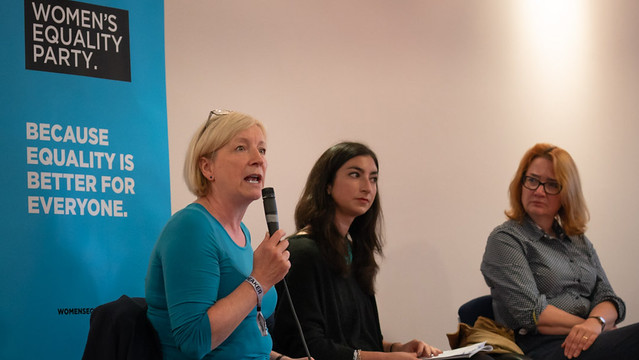Associate Professor Sue Milner from the Department of Politics, Languages & International Studies, has chaired two different talks at this year’s Women’s Equality Party conference and The UK in a Changing Europe Gender & Brexit conference.
Prior to the two events, Dr Milner had been on a semester's sabbatical with the Institute for Policy Research, working on Brexit and how it will affect areas of policy broadly on women and employment. She works on gender pay gaps and policies to tackle them, and on work-family policies.
Dr Milner spoke at a packed meeting on Brexit during the Women’s Equality Party’s second conference in early September. She examined the impact of EU withdrawal on women and drew on work by the Equalities and Human Rights Commission to raise a number of concerns about gaps in equalities rights and protections.
Focusing on the Charter of Fundamental Rights, which Parliament voted not to incorporate, Dr Milner argued that loss of an overarching principle of gender equality makes British law vulnerable to restrictive interpretation of rights to equal treatment. She also drew attention to fears that the adoption of so-called Henry VIII powers in the EU Withdrawal Bill, which raises the possibility that important questions about, for example, parental rights and more broadly the future of work and employment will simply be closed off and regulated behind closed doors, instead of being aired in a wide public debate.
At the The UK in a Changing Europe Gender & Brexit conference on 20 September, Dr Sue Milner chaired the session Space, place and diverse experiences of Brexit. Lisa McKenzie (Middlesex University), Rachel Minto (Cardiff University) and Vivienne Hayes (Women’s Resource Centre) formed the panel for this talk and examined why many women felt left behind by Westminster and voted Leave in the referendum. Dr Mckenzie spoke powerfully of the need to engage with those feelings of disempowerment, and urged those present at the conference to show solidarity with women (and men) whose needs have been ignored for too long.
Vivienne Hayes of the Women’s Resource Centre also highlighted that services supporting the most vulnerable women and girls in British society continue to bear the brunt of spending cuts, at a time when demand for them is increasing.
Dr Milner concluded that whatever the outcome on 29 March 2019, bridging social and political divisions will require sustained effort and engagement. She said that “tackling women’s under-representation in public life and their social and economic disadvantage means investment in communities, in public infrastructure such as education and training, and in care, and it has to be taken seriously.”

